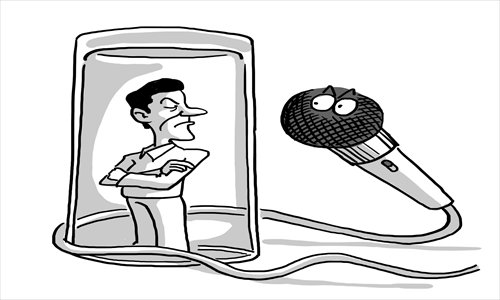Online editors to blame for public's reluctance to engage with media

Recently there was a famous post online in which a microblogger talks about a bachelor newspaper journalist who was always being introduced to ladies by matchmakers. Instead of finding his true love, he developed them into contacts and news sources, breaking the record for the number of reports in his office.
Whether this story is true or not, the protagonist is the object of envy of many married journalists, including me.
As the New Year approaches, our team is making preparations to air special editions of programs. Our plan was to invite some Chinese tailors to talk about how they made Chinese cheongsam, or mandarin gowns.
I found some telephone numbers online and made some calls, but none of them showed any interest in taking part. "We don't want to accept any media interviews." "The boss is not in town and we cannot make the decision."
The most polite reply was: "If you want, you can come and take some footage, but we won't say anything in front of the camera, and we won't lend you any garments either."
Contacting has become the most difficult part of making a TV program, compared to early stage planning, writing scripts, shooting video and editing, unless the person you want to interview is an acquaintance.
Talking to ordinary individuals and persuading them to cooperate with you is especially difficult, even though I repeatedly tell them that this is a good chance for publicity and business, and is not a negative report.
Of course, building long-term and steady contacts is of great importance to reporters. But the beginning is becoming extremely hard. This problem has been bothering me for quite a while, and is also a source of trouble for many of my colleagues.
I have taken some time to think about why contacts are becoming so indifferent, or in some cases even negative. One of my contacts tells me that a major concern for them comes from uncertainty about the real identity of the journalist. Many phone fraud cases reported on TV and in newspapers help people raise their awareness of being cheated.
Worrying about privacy infringement and thus potential threats to their property, they tend to turn down interviews. At times, even when journalists can prove their identity, their reports may still be doubted by many interviewees as having malicious intent.
The recent Australian radio hoax incident again pushed the media into a swirl of criticism. Two hosts pretending to be members of the British royal family made a prank phone call, prompting one nurse to reveal information about the pregnant Duchess of Cambridge.
Tragedy struck after the program was aired, when the nurse involved committed suicide. When recalling the story, the two hosts felt guilty and burst into tears in front the camera.
Online media are also supposed to be responsible. In order to attract more attention, some articles' headlines are excessively sensational, and are completely inconsistent with or even contrary to the contents.
This phenomenon is more evident in news reports repackaged by online media. They tend to use exaggerations and ambiguous words to make the most absurd links and give readers the wrong information.
One case in point was a report titled: "Expert says medical treatment is not expensive," which stirred up netizens' anger. But after reading the whole article, you eventually find that the expert who came up with this statement has lots of valuable things to say.
Although the truth comes out in the end when readers finish the article, this will definitely lead to discontent among people related to the news, and of course the potential interviewees.
The author is a TV producer based in Jiangsu Province. opinion@globaltimes.com.cn